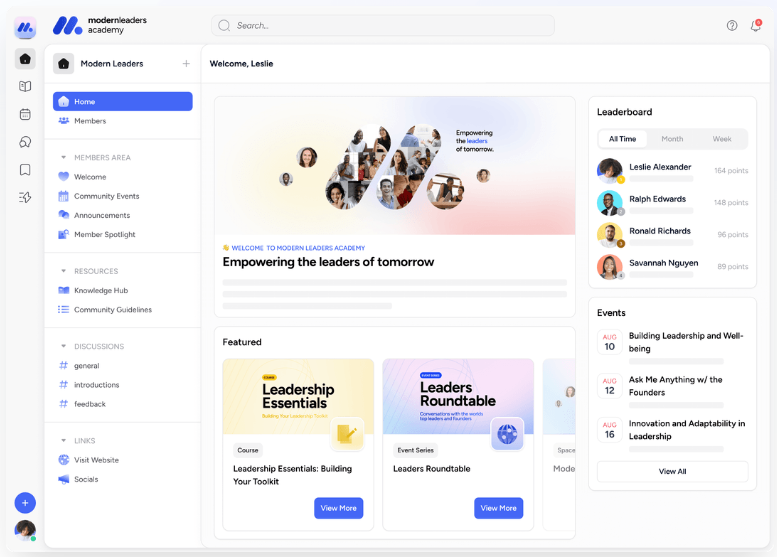Top AI-Powered Digital Learning Platforms for Modern Learning (2026)

TL;DR
- What it enables: Online education delivery that mimics traditional classroom interactions with flexible, self-paced learning experiences.
- What it includes: Video lectures, interactive courses, discussions, quizzes, collaborative projects, and real-time instructor interaction features.
- Key elements: Mobile compatibility, robust security, AI personalization, analytics tracking, and community support for enhanced engagement.
- Top 3 types for 2026 include: Social learning platforms, course marketplaces, and traditional LMS/LXP systems.
- Why it matters: Provides accessible, cost-effective education with global connectivity and personalized learning paths for skill development.
The rise of digital learning platforms has been meteoric, especially following the COVID-19 pandemic which forced a significant portion of the global population to shift to online education.
These platforms serve as integrated online services that facilitate the delivery and management of educational content, creating learning experiences that mimic traditional classroom interactions through features like discussions, quizzes, and collaborative projects.
Selecting a digital learning platform requires an understanding of learners’ specific needs to design effective training programs.
Mobile compatibility and robust security features are also significant, allowing access to content from any device and protecting user information.
What are online learning platforms?
Digital learning platforms are online environments designed to help students learn new skills.
These platforms provide opportunities for both course creators and learners to engage with a wide array of educational content. An online course platform is a key factor in selecting the best tools for educational content delivery, offering unique features tailored to both learners and course creators.

From video lectures and interactive courses to personalized learning experiences, these platforms cater to diverse learning preferences and needs.
One of the key features of these platforms is their ability to offer real-time interaction between students and instructors, enhancing the overall educational experience.
Additionally, some platforms include certification options that add credibility to learners upon course completion. The interaction between students and communities on these platforms further enriches the learning process and motivation levels.
With a variety of course structures, content availability, community support, and pricing models, each platform offers a unique experience.
This diversity allows learners to find the best online learning platform that suits their individual needs and goals.
Emerging trends in digital learning platforms
Incorporating artificial intelligence means personalizing user experiences and automating administrative responsibilities, making learning more efficient and engaging.
AI-driven tools, like those integrated into Disco, enhance automation and streamline learning processes.
Micro-learning, which presents content in brief segments, is becoming popular for its flexibility and ability to integrate into daily routines.
Additionally, virtual and augmented reality is gaining traction in training, providing immersive experiences that enhance skills development and team building.
Why should you use a digital learning platform?
The benefits of digital learning platforms are vast and varied.
These platforms are increasingly recognized for their ability to offer structured, flexible learning experiences that accommodate diverse student needs.
The flexibility of online learning platforms allows users to learn at their own pace, making education accessible to different learning styles and schedules.
Digital platforms also enable global connectivity, allowing students to engage with diverse cultures and perspectives. This global reach, combined with the cost-effectiveness of online learning compared to in-person instruction, makes these platforms an attractive option for many.
Moreover, the use of analytics to track student progress and engagement helps educators customize curricula to fit individual student needs, further enhancing the learning experience.
Engaging digital lessons that incorporate various media can lead to better retention of information, making learning more effective.
Whether for personal development or professional growth, digital learning platforms provide an accessible education solution that promotes skill development and interactive learning.
3 types of digital learning platforms
Digital learning platforms come in various forms, each catering to different learning needs and styles. These platforms can be broadly categorized into course marketplaces, learning management systems (LMS), and social learning platforms.
Each type offers unique benefits and features, making them suitable for different educational contexts.
Social Learning Platforms
Social learning platforms elevate the educational experience by integrating community features that promote real-time interactions and discussions.
These platforms leverage social elements to foster deeper engagement and collaboration among learners, enhancing the overall learning journey.
By facilitating direct interaction and providing robust community support, social learning platforms make the learning process more dynamic and enjoyable.
Examples:
- Disco
- NovoEd
- 360 Learning
Course Marketplaces
Online course platforms, such as Udemy, are learning destination sites that allow users to discover and enroll in various online courses and micro-credentials.
These platforms provide access to a diverse range of topics and educational content from various instructors and institutions, making them a flexible online learning platform for many.
Students should prioritize the experience and qualifications of tutors when choosing a course platform to ensure quality learning.
Course marketplaces offer a wide variety of options, allowing learners to find the best online learning platform that suits their needs and interests.
Examples:
- Coursera
- Udemy
- Section School
Traditional LMS and LXP
A Learning Management System (LMS) is a comprehensive online platform designed to create, deliver, and manage training programs, track learner progress, and automate remote learning processes.
These systems are widely used in corporate training, compliance, certification, and user management, offering structured learning environments that enhance efficiency and engagement.
Traditional LMS platforms often come equipped with features that facilitate user engagement and streamline communication.
For instance, SCORM compliance, as seen in platforms like Teachable, ensures seamless integration of e-learning content, making these platforms indispensable for managing group learning classes and providing effective access to educational content.
On the other hand, a Learning Experience Platform (LXP) focuses on creating personalized learning experiences by leveraging AI and data analytics.
LXPs curate content from various sources, offering learners a more tailored and engaging educational journey.
These platforms prioritize learner-driven content discovery, social learning, and skill development, making them ideal for organizations looking to provide a more dynamic and interactive learning experience.
Examples:
- Canvas LMS
- Moodle
- Thinkific









